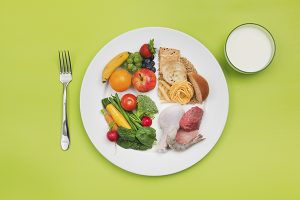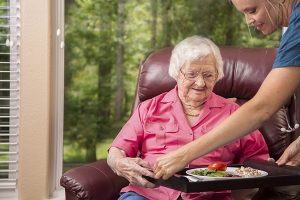
We are all aware that a wholesome diet is required for a healthy body. What a lot of people don’t understand, however, is that as we get older, our dietary needs change. Analysts at Tufts University have created the MyPlate system, an upgrade on the old food pyramid, which supplies updated and improved guidelines for ensuring optimal nutrition for seniors.
The MyPlate for Older Adults model stresses the importance of foods that are high in vitamins and minerals and low in fat, salt and sugar; however, it also includes instructions pertaining to suggested routine physical activities and fluid intake, aspects that are of particular concern for older adults.
Due to reduced activity, older adults tend to need less calories as they age, but their bodies still have the need for the same or higher levels of nutrients and regular activity for optimum health. MyPlate for Older Adults recommends focusing nutrition on:
- Bright-colored vegetables such as carrots and peppers
- Deep-colored fruits, like nectarines and berries
- Whole, enriched and fortified grains and cereals, such as brown rice
- Low- and non-fat dairy products such as yogurt and low lactose milk
- Liquid vegetable oils, and soft spreads that are low in trans and saturated fats
- Spices to replace salt
- Fluids like water and fat-free milk
- Physical activity, such as walking, resistance training, and light housework
Advised adjustments include utilizing bags of frozen pre-cut vegetables that can be resealed, and individual-serve portions of canned fruit – options that can be easier to prepare and have a longer shelf life, decreasing waste.
Dietary Tips for Persons with Dementia
Persons with dementia may also experience eating difficulties: the person may have lost his sense of smell so that food isn’t appetizing any more, or he can’t handle utensils. Our Care Managers suggest cutting food into small pieces that can be eaten with the fingers as a simple solution. Plus, preparing small meals with only two foods on a plate and more frequent (but healthy) snacks is a way we make sure our clients with dementia get the necessary calories and variety of foods that make for a good diet, rather than serving the traditional 3 meals a day.
At Stowell Associates, one of the top providers of home health care services in Milwaukee, WI, we provide the best highly specialized in-home Care Management and dementia care, and we understand how tricky it can be to help ensure the best nutrition for seniors. Our dedicated caregivers can help plan and prepare healthy, nutritious, and appetizing meals based around your senior loved one’s distinct nutritional needs. Contact us online any time or call 262-521-3016 to learn more about our in-home care services or to schedule an in-home assessment. See our full Wisconsin home care service area outside of Milwaukee.












